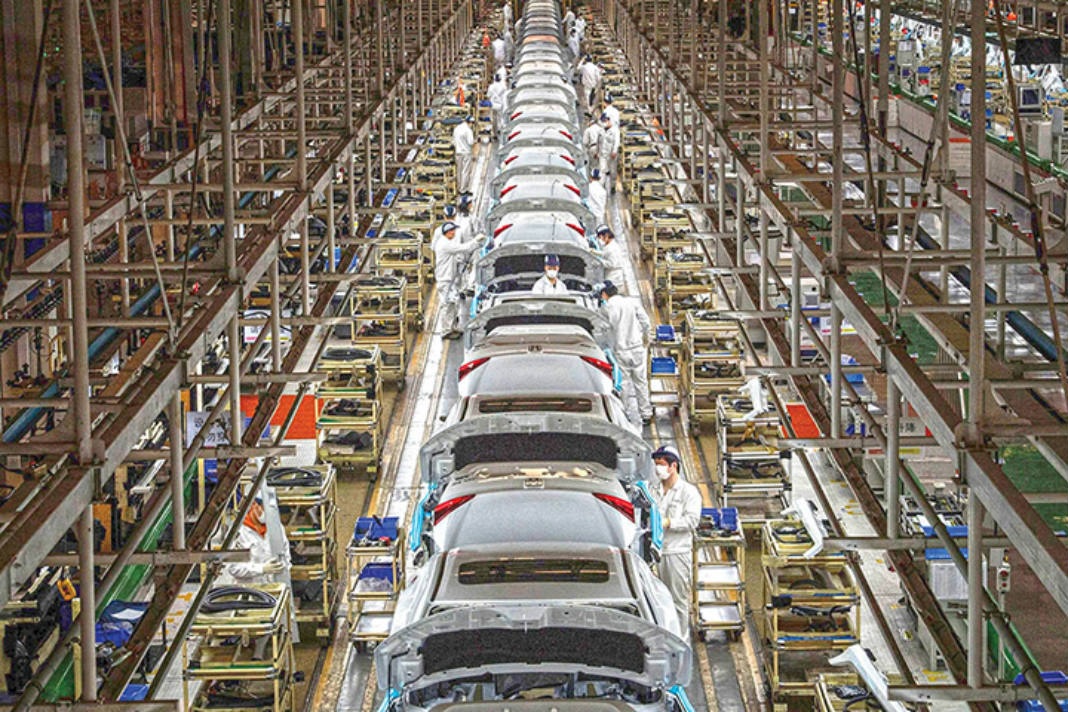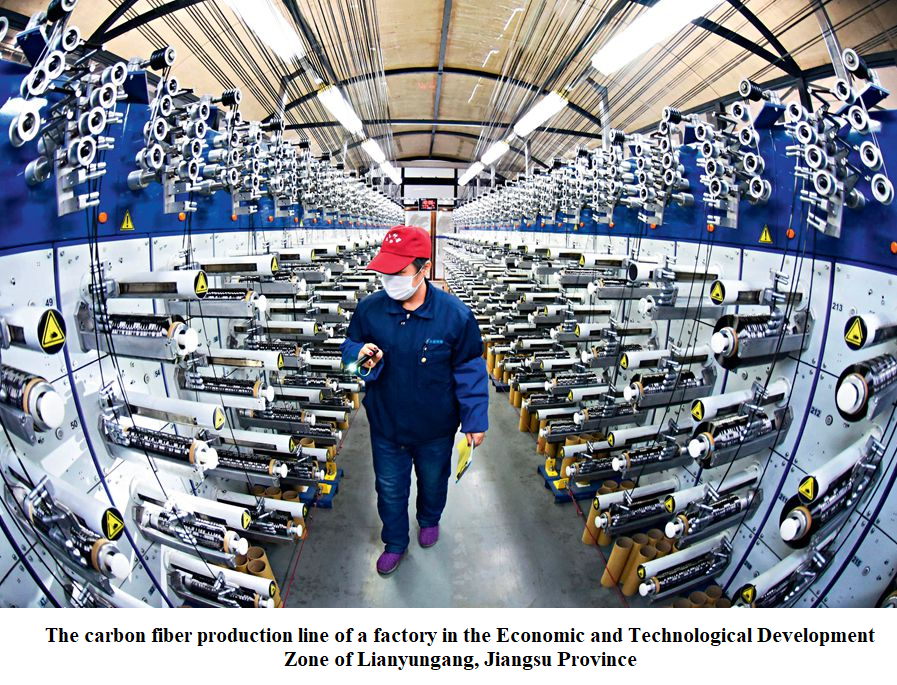China spends billions of dollars in subsidies

The Chinese government directs hundreds of billions of dollars in subsidies to favored domestic companies every year, according to a new study, and does so at a far greater rate, relative to the size of its economy, than other developed and developing countries.
 The new analysis was conducted by the Center for Strategic and International Studies, a Washington-based think tank. It found that the benefits, in the form of direct subsidies, below-market-rate loans and land sales, tax breaks, and capital provided by state-run investment funds in 2019 were worth at least $248 billion and as much as $407 billion, depending on how exchange rates are accounted for.
The new analysis was conducted by the Center for Strategic and International Studies, a Washington-based think tank. It found that the benefits, in the form of direct subsidies, below-market-rate loans and land sales, tax breaks, and capital provided by state-run investment funds in 2019 were worth at least $248 billion and as much as $407 billion, depending on how exchange rates are accounted for.
The figure amounts to 1.73% of China’s gross domestic product in 2019, a far higher percentage than was recorded in seven other countries examined by the authors.
Gathering the same data from Brazil, France, Germany, Japan, Taiwan, South Korea and the United States, the authors found that the country with the next largest percentage of GDP spent on promoting industrial policy was South Korea, at 0.67%. The United States, by contrast, spent about 0.39% of GDP on subsidies and other benefits to private businesses.
“Even when utilizing a conservative methodology, China is an outlier,” the report finds. “It spends far more on supporting its industries than any other economy in the study.”
According to the authors, their estimate of China’s spending is probably lower than the actual amount Beijing directs toward favored companies, because the study “excludes unquantifiable instruments of industrial policy and may underestimate measures where data are unavailable or incomplete. Therefore, total industrial policy spending in China may be significantly higher.”
Spotlight on trade practices
The study was written by CSIS senior fellow Gerard DiPippo; fellow Ilaria Mazzocco; Scott Kennedy, senior adviser and trustee chair in Chinese business and economics; and Senior Vice President Matthew P. Goodman. It is the first to attempt to quantify the degree of financial support China puts into its execution of industrial policy.
The report carries a note indicating that it was “made possible by generous funding from the U.S. Department of State.”
The authors say their findings show that “greater transparency and more harmonized reporting about industrial policy spending is vital.” They call on governments “to consistently provide more comprehensive and detailed data about the ways in which they support their companies and industries.”

The report stops short of calling for specific actions to address the disparity in support received by Chinese and non-Chinese firms.
“There are strengths and weaknesses to using data to shape policy at various levels of governance (from unilateral to multilateral) and with different levels of constraining authority (e.g., as a source of transparency or as a tool for imposing penalties),” the authors write. “Policymakers need to determine how best to employ this new information, keeping in mind the potential trade-offs between speed, legitimacy, and effectiveness when responding to China and other countries’ industrial policies.”
However, the report is likely to renew calls among leaders in the U.S., Europe and other countries that compete with China on the global stage for a response.
For many years, leaders in the U.S. and elsewhere have complained that support from the Chinese government allows Chinese firms that export goods and services to offer artificially low prices. This allows them to capture a larger share of the market than they otherwise would have and makes it difficult for unsubsidized firms to compete.
‘Not surprising’
“It’s not surprising that government subsidies are as wide and deep as reported,” Doug Barry, a senior director with the U.S.-China Business Council, told VOA in an email exchange. “Such substantial subsidies are unfair to foreign nonsubsidized competitors, including many U.S. companies. The subsidies appear to violate the spirit if not the letter of WTO rules and principles.”
Barry said that U.S. companies that do business in China had hoped that the issue of subsidies would be part of a “Phase Two” negotiation between Washington and Beijing, following an agreement the Trump administration reached with Beijing in 2020.
However, China failed to live up to promises to purchase billions of dollars of U.S. goods, putting a hold on progression to the next phase of discussions. That, and the revelation of the extent to which China subsidizes its domestic company, may foreshadow further punitive action from the U.S.
“Another round of tariffs and other sanctions may be in the offing,” Barry said. “This would be unfortunate for U.S.-China relations and the global trading system.”
Administration’s position unclear
Late last year, the Biden administration signaled that it was considering the launch of a new investigation into China’s trade practices, which could result in the imposition of further tariffs.
However, the CSIS report was released on the same day that U.S. President Joe Biden moved global markets by suggesting he might lift some of the tariffs imposed on $360 billion worth of goods imported to the U.S. from China every year.
The tariffs were put in place by his predecessor during a trade war with China in 2018 and 2019.
Asked about Treasury Secretary Janet Yellen’s suggestion that some of the tariffs be lifted, Biden said he was “considering” it.
“We did not impose any of those tariffs. They were imposed by the previous administration, and they are under consideration,” he said.
Biden was in Japan on Monday to unveil the Indo-Pacific Economic Framework, a set of negotiating points on trade practices adopted by the U.S. and 12 other nations, including Japan, South Korea, India, Australia and others.
China silent
As of Tuesday, the Chinese government had not issued an official response to the report. A request from VOA for comment from the Chinese embassy in Washington had not received a reply when this story was published.
In the past, China has pushed back against U.S. claims that it unfairly advantages its domestic businesses. In February, Chinese Foreign Ministry Spokesperson Zhao Lijian said that the U.S. should not “denigrate China’s development path. He added, “[H]ow the US develops itself and enhances its competitiveness is its own business, but it shouldn’t make an issue out of China, still less use it as a pretext to meddle in China’s domestic affairs and harm China’s interests.”
In November of last year, Chinese President Xi Jinping said that his country was willing to engage in “active and open” talks about trade, including the issue of subsidies.
U.S. industrial policy
While U.S. leaders frequently complain about China’s industrial policy, in recent years the federal government has shown a greater willingness to use its influence to affect decisions normally left to the domestic private sector.
Shortages of key medical equipment at the beginning of the coronavirus pandemic, and major supply chain problems in 2021 have spurred lawmakers to act. In July 2021, for example, Congress approved $52 billion in financing to support the construction of semiconductor manufacturing plants in the U.S.
Just last week, Biden invoked the Defense Production Act to address a shortage of infant formula in the U.S., requiring that the companies that produce the ingredients of formula to give priority access to those goods to specific companies.
One lawmaker who has been particularly vocal on the topic of industrial policy is Senator Marco Rubio. In April, the Florida Republican introduced legislation to support U.S. mining of rare earth minerals used in sophisticated electronics and batteries.
“I hope my colleagues in the Senate will join me in passing this piece of legislation, which is vital to keeping our country safe,” Rubio said in remarks on the Senate floor. “However, we can’t stop with rare earth metals. There are other industries equally essential to our national and economic security that need reshoring. In the coming months, it is critical that we begin rebuilding our capacity to produce pharmaceuticals, semiconductors, and more.”
He added, “This is the kind of targeted industrial policy America needs to maintain its status as a great power.” (Courtesy: Voice of America, VOA)
-
Book Shelf
-
 Book Review
DESTINY OF A DYSFUNCTIONAL NUCLEAR STATE
Book Review
DESTINY OF A DYSFUNCTIONAL NUCLEAR STATE
- Book ReviewChina FO Presser Where is the fountainhead of jihad?
- Book ReviewNews Pak Syndrome bedevils Indo-Bangla ties
- Book Review Understanding Vedic Equality….: Book Review
- Book Review Buddhism Made Easy: Book Review
- Book ReviewNews Elegant Summary Of Krishnamurti’s teachings
- Book Review Review: Perspectives: The Timeless Way of Wisdom
- Book ReviewNews Rituals too a world of Rhythm
- Book Review Marx After Marxism
- Book Review John Updike’s Terrorist – a review
-
-
Recent Top Post
-
 Commentaries
Impasse over BRI Projects in Nepal
Commentaries
Impasse over BRI Projects in Nepal
-
 CommentariesNews
Yet another Musical Chairs in Kathmandu
CommentariesNews
Yet another Musical Chairs in Kathmandu
-
 CommentariesTop Story
Spurt in Anti-India Activities in Canada
CommentariesTop Story
Spurt in Anti-India Activities in Canada
-
 NewsTop Story
Nepal: Political Stability Under Threat Again
NewsTop Story
Nepal: Political Stability Under Threat Again
-
 NewsTop Story
Accountability Tryst With 2024 Ballot….
NewsTop Story
Accountability Tryst With 2024 Ballot….
-
 NewsTop Story
What Would “Total Victory” Mean in Gaza?
NewsTop Story
What Would “Total Victory” Mean in Gaza?
-
 CommentariesTop Story
The Occupation of Territory in War
CommentariesTop Story
The Occupation of Territory in War
-
 CommentariesTop Story
Pakistan: Infighting in ruling elite intensifies following shock election result
CommentariesTop Story
Pakistan: Infighting in ruling elite intensifies following shock election result
-
 CommentariesTop Story
Proforma Polls in Pakistan Today
CommentariesTop Story
Proforma Polls in Pakistan Today
-
 CommentariesTop Story
Global South Dithering Away from BRI
CommentariesTop Story
Global South Dithering Away from BRI
-
AdSense code



















